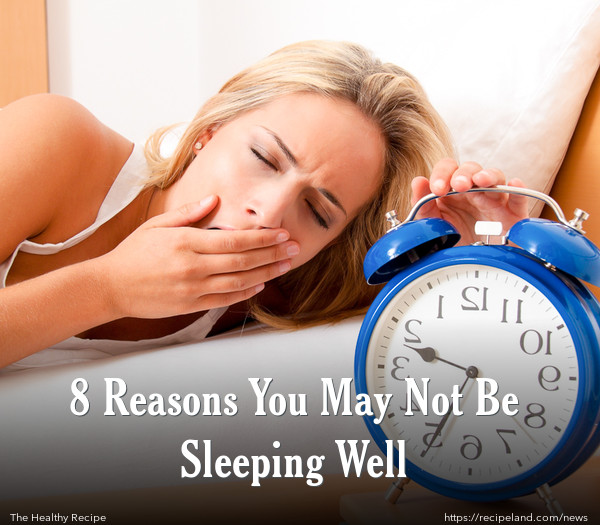So, you get nice and tucked in, ready for a good night’s sleep. The temperature is perfect, you have a comfy pillow, and the lights are out. Although you have set the perfect stage, you eventually find yourself pacing in the middle of the night, unable to fall back asleep. When you don’t get a good night’s sleep, you end up tired and cranky, not to mention vulnerable to a number of health conditions.
Good sleep is necessary for good health. Carl Bazil, of the Division of Epilepsy and Sleep at Columbia University, states, "Quality sleep belongs up there with exercise and nutrition in the pantheon of healthy living, It's so integral to health, it should be part of your primary care."
When you sleep poorly, it could be an indicator of many problems, some are easily curable and some may be symptoms of more serious issues. Here are some examples of the causes for a poor night’s sleep.
1. Feeling like you could sleep forever.
If you feel like you could sleep for a whole day, this could be a sign of an underactive thyroid or an underlying infection. Typically, people require no more than 7-9 hours of sleep to get good rest. Hypothyroidism can slowly creep up on you, causing weight gain and fatigue, and lead you to feel constantly tired. If you are sleeping for too long, consult your doctor to rule out medical causes.
2. You wake up tired every day.
For those who sleep the right amount of hours yet wake up exhausted, this could be a sign of sleep apnea or depression. Sleep apnea interrupts healthy sleep cycles, yet you won’t realize that you are constantly waking. One of the most common signs is loud snoring. If you suspect sleep apnea, consult your doctor. Also try sleeping on your back to see if you feel more rested. Sleep apnea can lead to serious health problems, including cardiovascular disease and heart attack, so it is important to check this out. Depression is another condition that can leave you feeling exhausted, so if sleep apnea is not the answer, consider visiting a therapist to consider depression as a cause.
3. You wake up too early, every morning.
If you find that you wake up too early, regardless of when you go to bed, your circadian rhythm could be disrupted. Waking too early every day may give you time to get more done, but you won’t feel rested or productive. Consider melatonin, a natural supplement that can promote healthy sleep patterns. Also, limit the amount of artificial light at bedtime, such as the kind produced by computers, cell phones, and televisions.
4. You cannot fall asleep without television.
If you need to fall asleep with the television on, you may be experiencing anxiety. People who fall asleep to late night television may be stuck in unhealthy routines, and worry about changing them because they might not fall asleep. Watching television can be a good distraction from worrying, but the light that is produced by the television can interfere with healthy sleep patterns and lead you to feel less rested in the morning. Consider picking up a good book for the last few minutes before you fall asleep instead, which can help you relax. Or try learning about meditation techniques to help you relax.
5. You wake frequently and can’t fall back asleep.
If you feel that you need to constantly move and stretch before you go to bed, then find that you are moving around constantly in bed, you may have restless leg syndrome. This is an uncomfortable condition that requires you to constantly move your legs, often in jerky movements, while you sleep. This can seriously disrupt your sleep. This is another condition that is linked to heart disease and strokes, so it is important to check out. In most cases, it is easily treated with prescription medicine from your doctor.
6. You eat while you are sleeping.
Some people get up in the middle of the night and go about usual daily routines, without having any recollection of the events that occur. That could include eating, or other household activities. This is often thought to be an REM disorder, where a person may be acting out their dreams. Sleepwalking can be dangerous, and it is usually easy to treat. Because it may be a sign of early onset Parkinson’s disease, you should consult your doctor if you find out you have been sleepwalking.
7. You have to urinate frequently in the middle of the night.
Frequent urination may be a sign of early diabetes. Because the kidneys are working hard to eliminate excess sugar from the body, you will find that you are urinating more frequently than usual. If avoiding beverages for a couple of hours before bed does not stop the problem, consult your doctor.
8. You experience heart palpitations in the middle of the night.
Occasionally you may experience the kind of stress that keeps you up at night. But, if you find that you should be relaxed and sleeping soundly, but you are waking with a racing heart, this could be a sign of hyperthyroidism or Graves disease. Talk to your doctor.
Don’t take the problem of poor sleeping lying down! If you are having trouble sleeping, it might be time to contact your doctor to make sure there are no serious underlying causes.










Comments